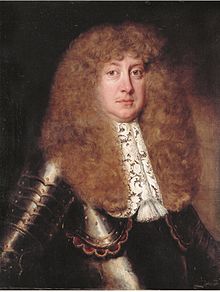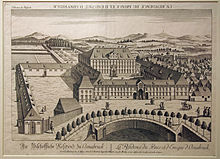
Sophia was Electress of Hanover from 19 December 1692 until 23 January 1698 as the consort of Prince-Elector Ernest Augustus. She was later the heiress presumptive to the thrones of England and Scotland and Ireland under the Act of Settlement 1701, as a granddaughter of King James VI and I. Sophia died less than two months before she would have become Queen of Great Britain and Ireland. Consequently, her son George I succeeded her first cousin once removed, Queen Anne, to the British throne. The succession to the throne has since been composed entirely of, and legally defined as Sophia's legitimate and Protestant descendants.

George I was King of Great Britain and Ireland from 1 August 1714 and ruler of the Electorate of Hanover within the Holy Roman Empire from 23 January 1698 until his death in 1727. He was the first British monarch of the House of Hanover.

The House of Hanover is a European royal house with roots tracing back to the 17th century. Its members, known as Hanoverians, ruled Hanover, Great Britain, Ireland, and the British Empire at various times during the 17th to 20th centuries. Originating as a cadet branch of the House of Welf in 1635, also known then as the House of Brunswick-Lüneburg, the Hanoverians ascended to prominence with Hanover's elevation to an Electorate in 1692. In 1714 George I, prince-elector of Hanover and a descendant of King James VI and I, assumed the throne of Great Britain and Ireland, marking the beginning of Hanoverian rule over the British Empire. At the end of his line, Queen Victoria's death in 1901, the throne of the United Kingdom passed to her eldest son Edward VII, a member of the House of Saxe-Coburg and Gotha, through his father Albert, Prince Consort. The last reigning members of the House of Hanover lost the Duchy of Brunswick in 1918 when Germany became a republic and abolished royalty and nobility.

The Duchy of Brunswick and Lüneburg, commonly known as the Duchy of Brunswick-Lüneburg or Brunswick-Lüneburg, was an imperial principality of the Holy Roman Empire in the territory of present day Lower Saxony.

The Principality of Calenberg was a dynastic division of the Welf Duchy of Brunswick-Lüneburg established in 1432. Calenberg was ruled by the House of Hanover from 1635 onwards; the princes received the ninth electoral dignity of the Holy Roman Empire in 1692. Their territory became the nucleus of the Electorate of Hanover, ruled in personal union with the Kingdom of Great Britain from 1714 onwards. The principality received its name from Calenberg Castle, a residence of the Brunswick dukes.

The House of Welf is a European dynasty that has included many German and British monarchs from the 11th to 20th century and Emperor Ivan VI of Russia in the 18th century. The originally Franconian family from the Meuse-Moselle area was closely related to the imperial family of the Carolingians.
Hanover is a territory that was at various times a principality within the Holy Roman Empire, an Electorate within the same, an independent Kingdom, and a subordinate Province within the Kingdom of Prussia. The territory was named after its capital, the city of Hanover, which was the principal town of the region from 1636. In contemporary usage, the name is used only for the city. Most of the historical territory of Hanover forms the greater part of the German state of Lower Saxony but excludes certain areas.

Sophia Charlotte of Hanover was the first Queen consort in Prussia as wife of King Frederick I. She was the only daughter of Elector Ernest Augustus of Hanover and his wife Sophia of the Palatinate. Her eldest brother, George Louis, succeeded to the British throne in 1714 as King George I.

George, Duke of Brunswick-Lüneburg, ruled as Prince of Calenberg from 1635. He was a member of the House of Welf, a prominent German noble family. George was part of a cadet branch of the family known as the Dukes of Brunswick-Lüneburg, which held territories in what is now Lower Saxony in Germany.
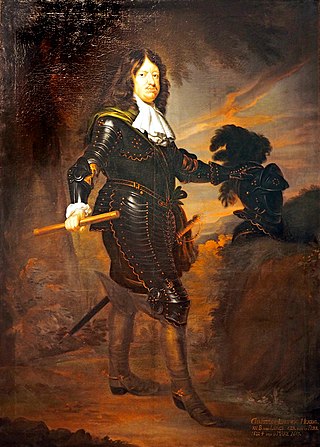
Christian Louis was Duke of Brunswick-Lüneburg. A member of the House of Welf, from 1641 until 1648 he ruled the Principality of Calenberg, a subdivision of the duchy, and, from 1648 until his death, the Principality of Lüneburg.

George William was the first Welf Duke of Lauenburg after its occupation in 1689. From 1648 to 1665, he was the ruler of the Principality of Calenberg as an appanage from his eldest brother, Christian Louis, Prince of Luneburg. When he inherited Luneburg on the latter's death in 1665, he gave Calenberg to his younger brother, John Frederick.

Herzberg am Harz is a town in the Göttingen district of Lower Saxony, Germany.
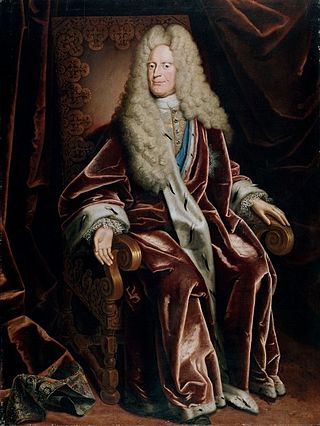
Anthony Ulrich, a member of the House of Welf, was Duke of Brunswick-Lüneburg and ruling Prince of Brunswick-Wolfenbüttel from 1685 until 1702 jointly with his elder brother Rudolph Augustus, and solely from 1704 until his death. He was one of the main proponents of enlightened absolutism among the Brunswick dukes.

The Electorate of Hanover was an electorate of the Holy Roman Empire, located in northwestern Germany and taking its name from the capital city of Hanover. It was formally known as the Electorate of Brunswick-Lüneburg. For most of its existence, the electorate was ruled in personal union with Great Britain and Ireland following the Hanoverian Succession.
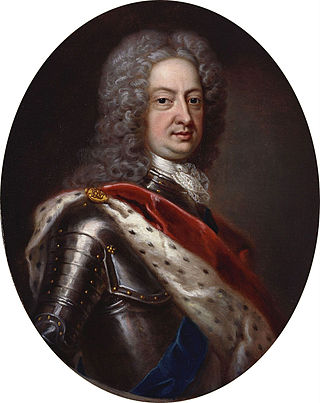
Ernest Augustus, Duke of York and Albany, was the younger brother of George I of Great Britain. Ernest Augustus was a soldier and served with some distinction under Emperor Leopold I during the Nine Years' War and the War of the Spanish Succession. In 1715, he became Prince-Bishop of Osnabrück.
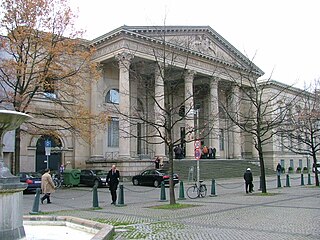
The Leine Palace, situated on the Leine in Hanover, Germany, is a former residence of the Hanoverian dukes, electors and kings. It is now the seat of the parliament of Lower Saxony.

Princess Anne Eleonore of Hesse-Darmstadt was the daughter of Louis V, Landgrave of Hesse-Darmstadt and Magdalena von Brandenburg. She was born in Darmstadt, Hesse, Germany.
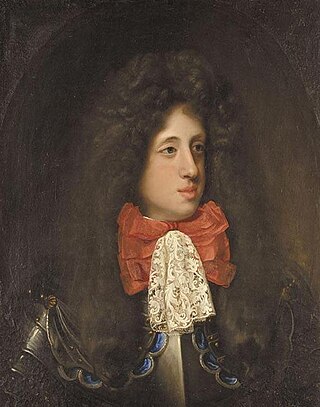
Duke Maximilian William of Brunswick-Lüneburg, often called Max, was a member of the House of Hanover who served as an Imperial Field Marshal.
The imperial election of 1711 was an imperial election held to select the emperor of the Holy Roman Empire. It took place on October 12.
